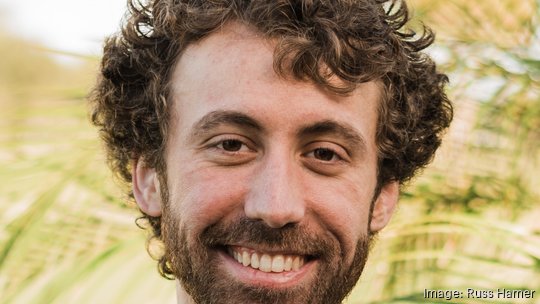
A local startup is among a dozen Ohio businesses to receive more than $2 million in grants to support research and licensing of new technologies in the state.
in April, the Ohio Third Frontier Commission approved a distribution of $2.6 million to 12 companies and two research institutions to support its efforts for further validation of early-stage technologies.
Lyceum AI is the only Greater Cincinnati-based company to receive funds. The startup was awarded $200,000. The licensing institute is the U.S. Navy.
Lyceum CEO and co-founder Russ Hamer, the associate director of emerging technology programs at Miami University, said he plans on using the $200,000 to get his web-based platform, which provides enhanced and personalized education and learning for students, into classrooms for pilot testing.
He told me this is a crucial step forward for his business.
“We’ll still be looking to pitch to investors, but $200,000 puts us in a place where we don’t have to sell an idea,” Hamer said. “We’ll have a product that’s in a classroom, and we’ll have user feedback.”
Hamer and his team of co-founders, who all consider themselves academics, are creating a product that addresses an issue they say is plaguing classrooms across the country: teaching to the middle.
According to Hamer, instructors are constantly losing the focus of the students who are excelling in a subject, while not being able to put as much focus on the students who are struggling.
“Our company is using generative AI (artificial intelligence) to build a teacher in-the-loop platform to help an instructor effectively communicate with all students in their class,” he said. “Each student is able to learn at the pace that’s appropriate for them.”
From the student perspective, it mostly functions like a chatbot, similar to ChatGPT.
“Students can engage via text and eventually we'll expand to audio and other forms of input,” Hamer said.
The company hasn’t been around for too long, but the founders have known each other for a while. A few years ago, they worked together on an AI grant from the Defense Advanced Research Projects Agency (DARPA) to build chatbots that would engage in contract negotiation for diplomats.
“We were working on that before ChatGPT came out, and then it changed everything we were doing,” he said. “When that project ended, we started thinking about the problems that we have with teaching and realized that generative AI would be really effective at helping us address some of those.”
According to Hamer, it's a difficult time to be an educator in America, with K-12 and higher education having the highest job burnout and job dissatisfaction rates in the country.
“Teachers are leaving the profession too fast, and it's going to be bad in the future,” he said. “If we can build tools that can help make teachers’ jobs easier and (improve) student learning outcomes, that’s a huge gain for our society.”
The Lyceum team plans on running pilot programs over the summer, while continuing to refine the product. A full launch is expected in the fall. The internal name for the product is Ellie, named after the grandmother of one of its founders. Educators will be able to rename Ellie as they wish.
“We want to be in classrooms for a full semester for free, so that come January, we can say to a district, ‘It’s been going great. Your teachers love it. Let’s talk about buying a license.’”
The tool is geared toward middle school, high school and college students. It is also subject agnostic, according to Hamer.
The startup applied for the Ohio Third Frontier Commission funds in January. Hamer said grants can be a difficult and unpredictable source of funding. Winners are usually revealed months after the grant application is submitted.
Despite their hit-and-miss nature, Lyceum is solely a grant-funded organization.
“We wanted to go for non-dilutive grant funds first versus diluting the company,” he said.
Hamer co-founded Lyceum with Sam Parks, Michael Flierl and Glenn Platt. Platt, too, works at Miami University. He’s known in the academic world for his work on one of the most impactful educational pedagogies in recent years, inverting the classroom.
The company is currently looking for districts willing to run the pilot over the summer and test the program out in the fall semester. Hamer said the AI craze is extremely exciting and has a capacity to be used for good by furthering the education system.
“The tech by itself doesn’t necessarily improve anything,” he said. “We don’t want to build solutions that are looking for problems, but we have problems in education right now and so finding things that can actually improve those is really important.”
Other Ohio recipients that received technology validation and startup awards include the following:
- University of Akron Research Foundation: awarded $100,000 to support the University of Akron Research Foundation Spark Fund, which will help validate novel technologies for commercialization purpose and provide structured programs to move ideas from concept to reality
- The Research Institute of Nationwide Children’s Hospital (Columbus): awarded $200,000 to support its Technology Department Fund. The fund is designed to advance inventions and intellectual property along the commercialization pathway to make early inventions more attractive and less risky
- Afference (Cleveland): awarded $200,000 to commercialize a haptic glove that provides realistic feedback and sensations
- Argos Advanced Solutions (Blacklick): awarded $200,000 to commercialize a technology focused on identity verification for personal and business smart devices
- Auxilium Health (Alliance): awarded $200,000 to commercialize a technology that will help patients suffering from chronic wounds
- CapV (Dayton): awarded $200,000 to commercialize a variable capacitor that enables digital tuning of radio frequency filters to avoid interfering signals and data loss to provide a secure communication link at a higher frequency and bandwidth
- Engineered Products of Ohio (Cortland): awarded $200,000 to commercialize a radio frequency identification tag that will be used to detect and avoid cybersecurity attacks
- Kaliz (Centerville): awarded $200,000 to commercialize a system that will provide early detection of diseases in animals and crops to prevent the spread of diseases and minimize economic loss to farmers and the food supply
- Nabu Optical Systems (Dublin): awarded $200,000 to commercialize a lithography tool to enable early-state designers to accomplish prototyping and low-to-moderate volume production for the creation of electronic chips
- NeoIndicate (Wellington): awarded $150,000 to commercialize a technology for diagnosing, imaging and selectively treating cancers
- Reglia Therapeutics (Cleveland): awarded $200,000 to commercialize a therapeutic that stops neurodegeneration and patient disability in diseases like Alzheimer’s, Parkinson’s, multiple sclerosis, Huntington’s and ALS
- Spetrin (Columbus): awarded $200,000 to commercialize a diagnostic kit that can detect early signs of heart failure before symptom onset, which represents a significant advancement in health care
- Visual Detection Systems (Minerva): awarded $200,000 to commercialize a wet wipe that changes color when it comes into contact with opioids.
The awards are focused on technology and tech-enabled products in advanced manufacturing, advanced materials, biomedical and life sciences, energy sensors and software and information technology.
“The funding will help create innovative and momentous improvements in health care, education and communication industries,” Lydia Mihalik, director of the Department of Development, said in a news release. “These technologies have the potential to change lives and alter the future of their industries for the better.”








